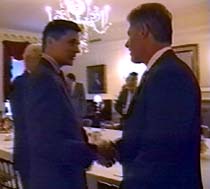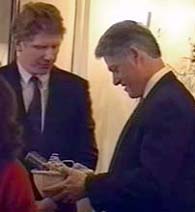Stalking the Mysterious Potus
The ReDiscovery Channel explores the secrets of the Potomac swamp's rarest wildlife.

Tonight on Wild Discovery, we explore the mysterious world of one of the rarest mammals to inhabit the eastern seaboard of the United States: the Potus (President of the United States). Among this biped's many remarkable qualities is an extraordinary aversion to cameras. If it realizes it is being observed, the Potus will camouflage itself spontaneously. Concealing the uncanny powers it has developed over hundreds of years, this, the most feared predator of the mid-Atlantic swamps, assumes the protective coloration of the lovable but harmless Potomac wonk. A polygamous, voracious predator in its natural state, the Potus suddenly appears as tame as a house pet: reclusive, altruistic, and monogamous.
To view the beast in its natural habitat, the ReDiscovery Channel deployed a team of highly skilled Navy divers to track the Potus over a period of two years. The videos they recorded had to be carefully concealed in the Potus' own lair until an opportune moment presented itself, whereupon they could be retrieved safely. Though the Potus' only natural predator, the North American Independent Counsel (known by its Latin name Sentellus Appointus), is almost as rare as the Potus itself, the Potus fears his stalker greatly. Like a giant boa, the Sentellus wraps itself around its victim and squeezes. Death is slow and painful.
In the rare footage you will see in a moment, the Potus is performing its most basic activity: gathering food. Whereas the squirrel stores acorns for the coming winter and the grizzly hibernates, the Potus, with its extraordinarily large brain, thinks ahead a full four years, the length of its basic biological cycle. Every fourth year, the Potus knows it must compete with other alpha-primates for the allegiance of the herd. For this contest, it needs not only fuel for its own frenetic activity but also food for the protein-depleting parasites that spawn in the fetid climate of the Potomac.
This extraordinary process of accumulation begins with an in-gathering of lesser donor mammals. These look like the Potus, only smaller and less frisky. Lower on the food chain, they serve their own distinct purpose in the ecosystem. The donor mammals collect greens in the wild and bring them in their sacks to an underground room that serves as an informal market. Here the Potus services the donors in various ways in exchange for the "gifts" they bring him. As this ritual has evolved, it is largely symbolic. Gifts and services are never directly exchanged, and the event is never referred to as a "fund-raiser," which is considered by the Potus and donors alike to be a vulgar and disagreeable term.
Rather, the Potus offers the donor mammals a bitter, viscous beverage, brewed from roasted beans and served in small porcelain cups. After drinking this potion, the donors are overcome by feelings of warmth and affection toward the Potus. This causes them to transmit to him the greens they have gathered. Through this, and through another elaborately evolved ritual known as "golf," the Potus causes the lesser mammals to part with the raw material he needs in order to triumph in the coming competition for leadership of the herd.
In the footage you are about to see, the Potus stalks and mounts a female donor. Please be advised that the videotape is for mature audiences only.
Emerging from his lair, the Potus fixes his gaze on a female donor exhibiting brilliant yellow plumage. Rather than abduct her directly, however, the Potus first approaches two other female donors standing together in a small donor flock. Suffusing the air with his attractive musk, he draws all three close to him. Click on the icon to observe how the Potus touches the two other donors with his left paw, leaving his right free to stroke the genetically most desirable one. The Potus benefits from a high degree of manual dexterity.
The mating ritual is over in an instant. Afterward, the Potus proceeds around the room, gloating to the males about his conquest.
Rarely does the Potus employ brute force (though he does employ the services of a small, vicious guard animal, the Ickus, seen in the clip).
Rather, the Potus uses elaborate mechanisms such as flattery and humor to woo his prey into parting with their greens. Click on the icon to see the Potus charm the visiting donors by mocking another beast for its shocking ignorance of popular culture.
Coffee-drinker: "Who's Carly Simon?"
Potus: "Who's Carly Simon?"
Coffee-drinker: "They think I'm old-fashioned."
Potus: "Bob Rubin, you know, didn't know who B.B. King was. ... Bob Rubin didn't know who B.B. King was. Bob Rubin didn't know who Aretha Franklin was! ... Alana Stewart was in the White House the other day. Rod Stewart's ex-wife, who was once married to George Hamilton. So I figure Rubin couldn't know who Rod Stewart was, if he didn't know who B.B. King and Aretha Franklin were. And sure enough, he didn't. It was great."
This last expression is one frequently used by the Potus to convey pleasure and satisfaction. Roughly translated, it means, "Potus is King of the Jungle; Potus is delighted to be a Potus."

T he Potus has an advanced digestive system, and has been known to consume such foods as Cheeseburgers, Fajitas, Lobster Fra Diavolo, Ribs, Chicken-Fried Steak, Pizza With Ham and Pineapple, Chocolate Mousse, Key Lime Pie, and Tutti-Frutti Ice Cream, all in one sitting. However, its main source of sustenance is greens. Sometimes, though, donors bring the Potus unsuitable things to eat in place of the $50,000 worth of herbs and stalks that are the ritual offerings at Potus-donor gatherings. The etiquette in such aberrant instances is for the Potus to appear pleased--though he will make a point of never, ever inviting the annoying donor to exchange favors with him again. Click on the icon to see the Potus' elaborate display of politesse in such a situation.
Guest: "Good morning, Mr. President, Richard Ober. I have a gift for you as well. This is a gift from the forests of New Hampshire--a basket that my wife made from a tree grown on our family wood lot and a book that I've co-written about the people and woodlands of northern New England. We would be honored if you would accept that."
Potus: "I'd love that ... thank you, that's wonderful. Thanks."
Potus (to assistant): "Tell them to take that and put it in the Oval Office."
I t is very important for the Potus to keep his habitat neat and tidy. For this reason, he is fond of the small gardening mammals that sometimes come from great distances to offer him their services. Click on this icon to see the highly skilled gardener Arief Wiriadinata present himself as a gift from a wealthy friend in Indonesia.
Arief Wiriadinata: "James Riady sent me."
Potus: "Yes, I'm glad to see you. Thank you for being here."
The Potus, being the most discreet of mammals, betrays only the slightest hint of the pleasure he feels at the news that he will receive a large gift of delicious Asian greens sometime in the near future.
Thank you for joining us this week on WildDiscovery. Next on the ReDiscovery Channel: the strange and amazing world of the Vice Potus.
